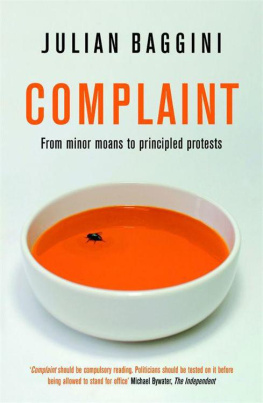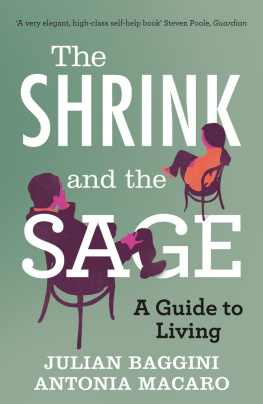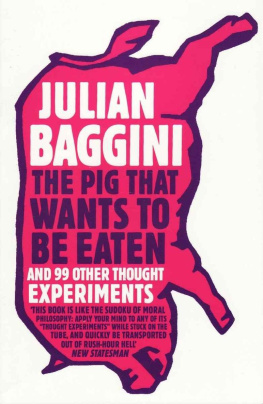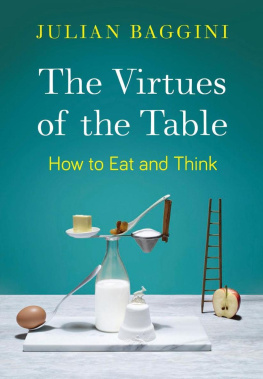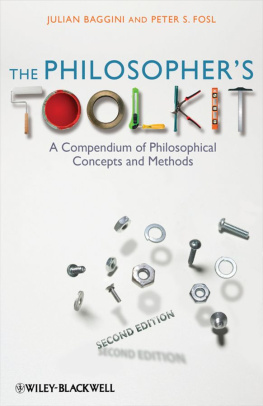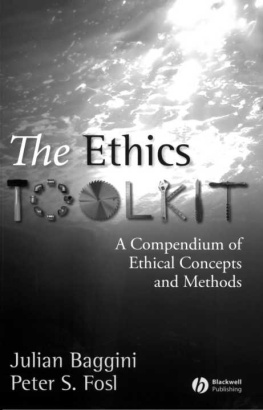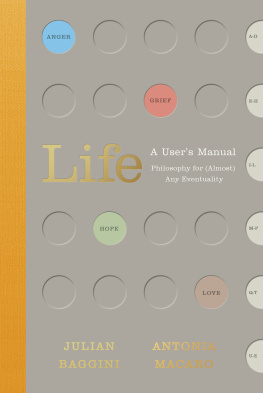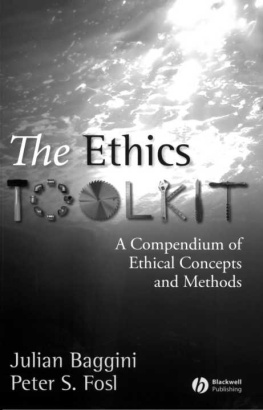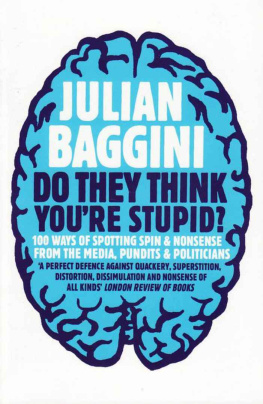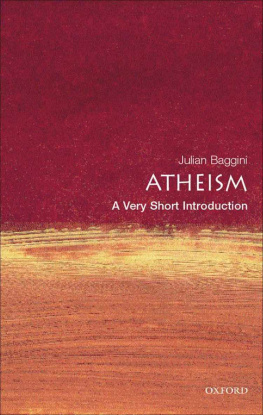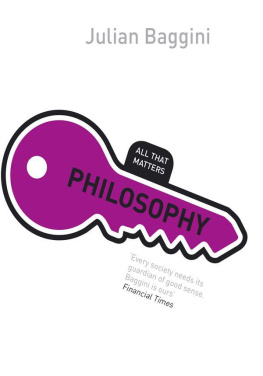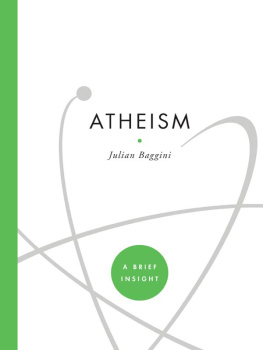Julian Baggini - Complaint: From Minor Moans to Principled Protests
Here you can read online Julian Baggini - Complaint: From Minor Moans to Principled Protests full text of the book (entire story) in english for free. Download pdf and epub, get meaning, cover and reviews about this ebook. year: 2010, publisher: Profile Books, genre: Politics. Description of the work, (preface) as well as reviews are available. Best literature library LitArk.com created for fans of good reading and offers a wide selection of genres:
Romance novel
Science fiction
Adventure
Detective
Science
History
Home and family
Prose
Art
Politics
Computer
Non-fiction
Religion
Business
Children
Humor
Choose a favorite category and find really read worthwhile books. Enjoy immersion in the world of imagination, feel the emotions of the characters or learn something new for yourself, make an fascinating discovery.
- Book:Complaint: From Minor Moans to Principled Protests
- Author:
- Publisher:Profile Books
- Genre:
- Year:2010
- Rating:3 / 5
- Favourites:Add to favourites
- Your mark:
- 60
- 1
- 2
- 3
- 4
- 5
Complaint: From Minor Moans to Principled Protests: summary, description and annotation
We offer to read an annotation, description, summary or preface (depends on what the author of the book "Complaint: From Minor Moans to Principled Protests" wrote himself). If you haven't found the necessary information about the book — write in the comments, we will try to find it.
Complaint: From Minor Moans to Principled Protests — read online for free the complete book (whole text) full work
Below is the text of the book, divided by pages. System saving the place of the last page read, allows you to conveniently read the book "Complaint: From Minor Moans to Principled Protests" online for free, without having to search again every time where you left off. Put a bookmark, and you can go to the page where you finished reading at any time.
Font size:
Interval:
Bookmark:
COMPLAINT
JULIAN BAGGINI is the co-founder and editor of The Philosophers Magazine. His books include Atheism, Whats It All About? Philosophy And The Meaning of Life, The Pig That Wants To Be Eaten, Do They Think Youre Stupid? and Welcome to Everytown: A Journey into the English Mind. To find out more go to www.julianbaggini.com.
As the twenty-first century moves through its tumultuous first decade, we need to think about our world afresh. Its time to revisit not only politics, but our passions and preoccupations, and our ways of seeing the world. The Big Ideas series challenges people who think about these subjects to think in public, where soundbites and polemics too often provide sound and fury but little light. These books stir debate and will continue to be important reading for years to come.
Other titles in the series include:
Jenny Diski The Sixties
Paul Ginsborg Democracy
Ian Hacking Identity
Eva Hoffman Time
Steven Lukes Moral Relativism
Susie Orbach Bodies
Renata Salecl Choice
Slavoj iek Violence
FROM MINOR MOANS TO PRINCIPLED PROTESTS
Julian Baggini

First published in Great Britain in 2008 by
PROFILE BOOKS LTD
3A Exmouth House
Pine Street
London EC1R 0JH
www.profilebooks.com
This eBook edition published in 2010
Copyright Julian Baggini, 2008, 2010
The moral right of the author has been asserted.
Typeset by MacGuru Ltd
This eBook is copyright material and must not be copied, reproduced, transferred, distributed, leased, licensed or publicly performed or used in any way except as specifically permitted in writing by the publishers, as allowed under the terms and conditions under which it was purchased or as strictly permitted by applicable copyright law. Any unauthorised distribution or use of this text may be a direct infringement of the authors and publishers rights and those responsible may be liable in law accordingly.
A CIP catalogue record for this book is available from the British Library.
eISBN 978 1 84765 278 2
1
THE NOBLE HISTORY OF COMPLAINT
2
IMPOSSIBLE COMPLAINT
3
MISTAKEN COMPLAINT
4
QUOTIDIAN COMPLAINT
Towards a future complaintology
5
COMPLAINT AND GRIEVANCE
So I have not said to my people: Get rid of your discontent. Rather, I have tried to say that this normal and healthy discontent can be channeled into the creative outlet of nonviolent direct action.
Martin Luther King, letter from Birmingham Jail, 16 April 1963
www.thecomplaintbook.com
Think of the word complaint and youre likely to conjure images of moaning, whining rants about mainly trivial matters: the trains dont run on time, people are so rude these days, theres nowhere to park, theres nothing on the television. Complaining has become a pastime of the resigned and the nostalgic. It has even become something of a leisure activity. In the UK the best-selling book one recent Christmas was the self-explanatory Is It Just Me or Is Everything Shit?, while the year before the runaway hit was Eats, Shoots & Leaves, a protracted complaint against the decline of proper grammar. The TV series Grumpy Old Men, which comprised people complaining to camera, was such a success it spawned the sequels Grumpy Old Women and Grumpy Old Holidays, as well as spin-offbooks and even a touring stage show. Even indie rock bands have discovered that being world-weary is cooler than getting angry, with Blur releasing an album called Modern Life Is Rubbish and The Kaiser Chiefs scoring a hit with their song Everything Is Average Nowadays. Complaining has become synonymous with moaning.
It neednt be this way. At the root of every complaint is a sense that things are not as they ought to be. To complain is to speak out against this, and we can do so petulantly, aggressively, calmly, pointlessly or constructively. It does not even matter whether we are truly upset by what we perceive to be wrong. Many people are never happier than when they get the opportunity to complain, while others are deeply unhappy with how things are, but just accept it. Complaint occurs when we refuse to accept that things are wrong and try to do something about it, even if that something is no more than articulating the fault.
Although the precondition for complaint is a belief that things are not as they should be, the mere recognition and expression of this fact are not enough for a fully formed complaint to be born. For example, a stoic may believe that it is important to accept the imperfection of the world, and so to recognise that things are not as they ought to be would, for her, be not to complain but simply to describe. Likewise, a committed pessimist may also like frequently to comment on whats wrong with everything, but again this is not really complaint because it lacks a non-acceptance of what is wrong.
There is an additional final component of complaint which is hard to pin down. Complaint is doubly transitive: you dont just complain about something, you complain to someone or something. However, as a criterion for identifying genuine complaints, this is hard to apply, because often what we direct our complaints to is entirely abstract: God, the fates, fortune or just the universe. Such generalised directedness can be hard to identify, but I think we can tell, in our own cases at least, the difference between merely thinking that something is wrong and hurling our rage about it into the empty air, as though someone should be listening and taking note.
Complaint can therefore be defined as a directed expression of a refusal or inability to accept that things are not as they ought to be. The definition is a little loose and almost certainly has exceptions, but, unlike many philosophers, Im happy with that. Language is more flexible than logic, and if you want to describe the world as it is, rather than remake it in a form fit for logicians, you have to be prepared to live with a certain amount of ambiguity. It also seems to me that complaint is a particularly indeterminate concept. Consider, for instance, the familiar scenario when someone appears to be having a moan, and they are told to stop complaining. Im not complaining, comes the reply, Im just saying. Often the person really is complaining and doesnt want to admit it, but the very concept of complaint opens up the wiggle-room for plausible denial. This is, I think, because the features of directedness and non-acceptance which are central to complaint admit of many degrees. It can therefore be hard to know how much our expressions that things are not right contain either or both.
Even if you prefer a slightly different definition, it should be plain that what we complain about can be trivial or profoundly important. All major social advances have started with a complaint. Emmeline Pankhurst and the suffragettes, Martin Luther King and the civil rights campaign, Nelson Mandela and the anti-apartheid movement: the changes they brought about all began with a complaint that the status quo was wrong and needed to be changed.
Next pageFont size:
Interval:
Bookmark:
Similar books «Complaint: From Minor Moans to Principled Protests»
Look at similar books to Complaint: From Minor Moans to Principled Protests. We have selected literature similar in name and meaning in the hope of providing readers with more options to find new, interesting, not yet read works.
Discussion, reviews of the book Complaint: From Minor Moans to Principled Protests and just readers' own opinions. Leave your comments, write what you think about the work, its meaning or the main characters. Specify what exactly you liked and what you didn't like, and why you think so.

